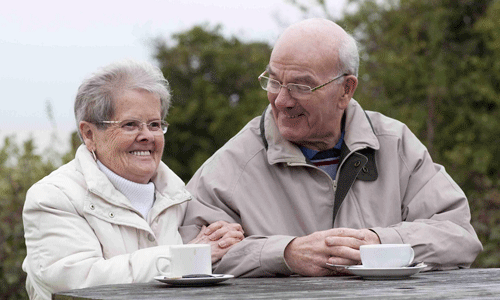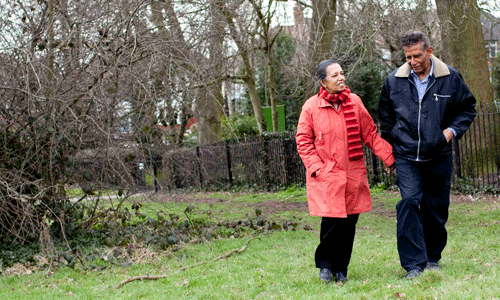
Sex in later life
Many older people enjoy an active sex life – and why not? While you might need to make some adjustments, getting older doesn't have to mean giving up on sex.
STIs and safer sex
If you have a new sexual partner or you have more than one sexual partner, you could be at risk of getting a sexually transmitted infection (STI) – regardless of your age and the gender of your partner. STIs can also be transmitted through non-penetrative sex.
The best way to prevent STIs is to have safer sex using condoms or dental dams.
If you’re worried you might have an STI, talk to your doctor. Alternatively, you can visit a sexual health (GUM) clinic to get tested.
Not all STIs have symptoms, so it's a good idea to have an annual sexual health check-up to be on the safe side.
Your body
Changes to our bodies as we get older mean that sex can be a bit tricky or uncomfortable. But there are steps you can take to make things easier.
Vaginal dryness
Some women experience vaginal dryness after the menopause. This can cause pain during sex. Using a vaginal moisturiser or lubricant might help.
Some kinds of soap and shower gel can make vaginal dryness worse. It's best to avoid using them on that part of your body – just warm water is enough.
If nothing you try yourself helps, speak to your doctor.
Erection problems
Most men experience erection problems as they get older. You can often alleviate these by making simple lifestyle changes – such as losing weight or quitting smoking.
If erection problems persist, speak to your doctor. They might prescribe you medication to help.
Your sex drive
Lots of people find that their sex drive decreases as they get older. This might be for a number of reasons, such as:
- a lower level of sex hormones
- a health condition
- side effects from medication.
Having a lower sex drive isn't necessarily a problem. But sometimes, it can lead to one or both partners feeling disappointed or rejected.
Taking time to relax together can help – whether that's having a glass of wine, spending time cuddling, or just having a chat. Talking about how you're feeling about sex can help put you both at ease.
Hormone replacement therapy
It’s common for women to lose interest in sex around the menopause, but hormone replacement therapy (HRT) can often help. HRT is used to relieve symptoms of the menopause by replacing hormones that you lose at that time.
Your physical health
As we get older, it's more likely that we'll develop a health condition such as a heart problem, arthritis or dementia.
If you're diagnosed with a health condition, it's sensible to check with your doctor that it's safe for you to be having sex.
Sometimes, the emotional stress that comes with a new diagnosis can impact your sex life. For instance, your partner might be worried about hurting or overexciting you. In turn, if your condition left scars or required amputation, you might worry about how your partner sees you now.
It might be that a health condition has made one of you more dependent on the other, too. This can have an impact on your sexual relationship.
Whatever the situation, it’s important to talk about your concerns and feelings with your partner.
You could try some new things together to see what feels good for you both. If physical pain or discomfort is an issue, you can also speak to your doctor – they should be able to help.
New relationships
If you're in a new relationship, it's important to discuss your expectations so that you each know what you want from your time together. This might include:
- whether you both want to have a sexual relationship
- your likes and dislikes
- any concerns you have about having sex
- any physical difficulties you have relating to sex.
Many of us feel self-conscious when we're with a new partner. Remind yourself that they probably feel the same way. It’s important to be open with your feelings – this will put you both at ease.
For more information call the Age UK Advice Line on 0800 678 1602.
We’re open 8am to 7pm, every day of the year.





